|
Automotive |
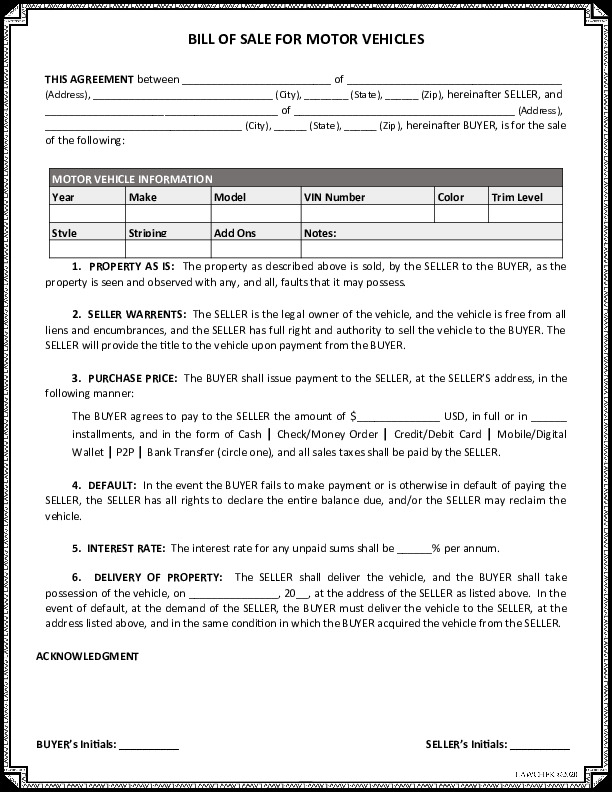 Bill of Sale for Buying or Selling a
Used Vehicle™ Bill of Sale for Buying or Selling a
Used Vehicle™
In the United States,
there are around 271,811,005 vehicles registered to
private owners see www.bankrate.com and
www.fhwa.dot.gov, including automobiles, trucks,
motorcycles, and buses. Out of that total number,
1.3 million used vehicles are sold each month by
private sellers see
https://www.statista.com and
https://www.coxautoinc.com, which is about .5% of
the total ownership transfer of private vehicles
each month. With all these used vehicle sales, one
may ask “What is the best way to proceed when buying
a used vehicle” or “What paperwork is needed when
selling a used vehicle.” In the world of used
vehicles, you will almost always need a Bill of
Sale.
More Info
|
 Car Accident - What do you do after an accident?™ Car Accident - What do you do after an accident?™
About 5.5 million car accidents are reported every
year. Most of us will only be in a few accidents in
our lifetime and most will be minor. However, when
an accident happens it can still disrupt your calm
and ruin your day. In addition to natural anxiety in
response to an unexpected event, the process of
working with the other driver, the police, and the
insurance companies can create further apprehension.
Much of the stress can be eased if you take a little
time now to prepare your vehicle and yourself for
the chance event of an auto accident.
More Info
|
 Vehicle Aftermarket Additions and Your Car Insurance Vehicle Aftermarket Additions and Your Car Insurance
For car enthusiasts, some of the joy of car
ownership involves the personalization of the
vehicle with several types of aftermarket products.
This can be as extreme as lowering the vehicle or
adjusting the engine to basic muffler changes or new
detailing. Any change to your vehicle can be
regulated by the laws in your state and aftermarket
parts must meet federal regulations as well.
Warranties are often the first battle ground if your
altered vehicle ends up in the shop. If your
insurance carrier is made aware of aftermarket
adjustments to your vehicle, this can impact your
premiums. There are some simple aspects to be aware
of before altering your car or truck.
More Info
|
|
|
Business |
|
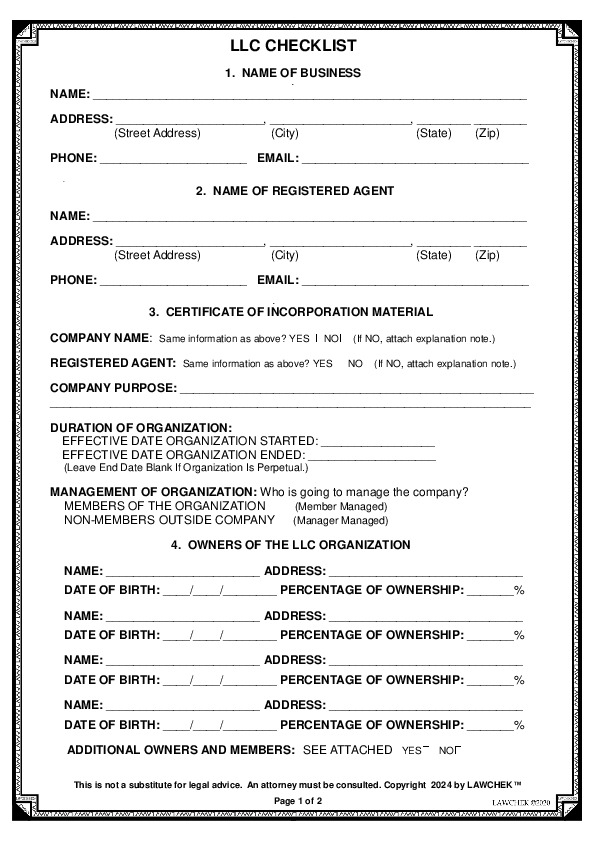 What is
Needed to Create an LLC? What is
Needed to Create an LLC?
Are you contemplating starting a business but, you
are concerned about the impact of company
liability on your, and your future partners',
personal assets and property? You are not alone.
Around 4.7 million businesses are started every
year. That average is according to data from the
US Census Bureau, as reported by USA Today. (See
More Info
|
 Domain Name Basics for your Business Domain Name Basics for your Business
Skeptics initially doubted the utility of the
internet and, in the early years of growth, many
businesses utilized a webpage like an online
business card that listed little more than their
contact information. Many were uncertain how to
promote their brand online which included the
dilemma of creating a domain name. New URLs that
included acronyms or catch phrases as well as
company names now competed across state lines and
even international borders. Today, the benefit of
maintaining a strong online presence is no longer in
question. Indeed, the internet provides consumers
24/7 access to even the smallest of businesses.
Legal professionals are no exception as they
discover the new challenges of translating their
brick and mortar business with an online presence.
More Info
|
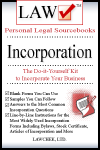 Incorporating My Business Incorporating My Business
This legal form book gives an overview and basic
understanding of Incorporation through a
question-and-answer format. It also furnishes some
basic Incorporation forms that most likely would be
used in a given state. This book should provide the
general types of Incorporation forms that an
attorney might employ in preparing and filing the
necessary documents for the Incorporation of a
business..
Website
|
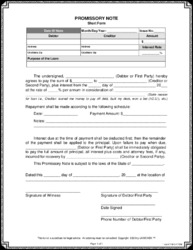 Promissory Note if I loan somone money? Promissory Note if I loan somone money?
When agreeing to loan money to an individual, a
family member, a friend, or a small business, it is
highly recommended that you document the financial
loan with some kind of written agreement. In many
cases, individuals exchange money on a daily basis
and, it is generally handled as a quick loan with a
verbal agreement and a handshake. It is estimated,
according to Finder, that $184 billion dollars each
year is exchanged between family and friends as
private loans.
More Info
|
|
|
Criminal |
 What is the difference between Civil and
Criminal Law? What is the difference between Civil and
Criminal Law?
What is the difference between Civil Law and
Criminal Law? Criminal Law is an action brought by
the government against an individual citizen for
acts committed against the public or society at
large. Criminal actions are handled by the criminal
court system and are usually identified with the
government as one party and the individual citizen
as the other party. The subject matter of the case
is relating to the alleged wrong doing committed by
the accused.
More Info
|
|
 I Want To Speak To My Lawyer I Want To Speak To My Lawyer
There are multiple applications of the 5th
Amendment but the most common form of the 5th
Amendment used by many citizens in the United States
is to prevent the government from using statements
made by an individual against themselves when they
are on trial. The 5th Amendment states:
More Info
|
|
|
Estate Planing |
 Charity 101 - Choose the Best & Avoid Scams Charity 101 - Choose the Best & Avoid Scams
Giving to others in need seems to be a natural
impulse the world over. Many of us enjoy giving to
causes, programs or research that we agree with and
believe in; however, sometimes we are caught unaware
and are asked to give by volunteers. We may love the
idea of the cause but know little about the
organization. Or we may like the idea, but prefer it
were handled differently. So where do you go to find
the best fitting charity and how do you determine if
they are legitimate? Below we have compiled some
things to consider when choosing a charity, such as
when to give, how to avoid scams, and other ways to
give to the community rather than a cash donation.
More Info
|
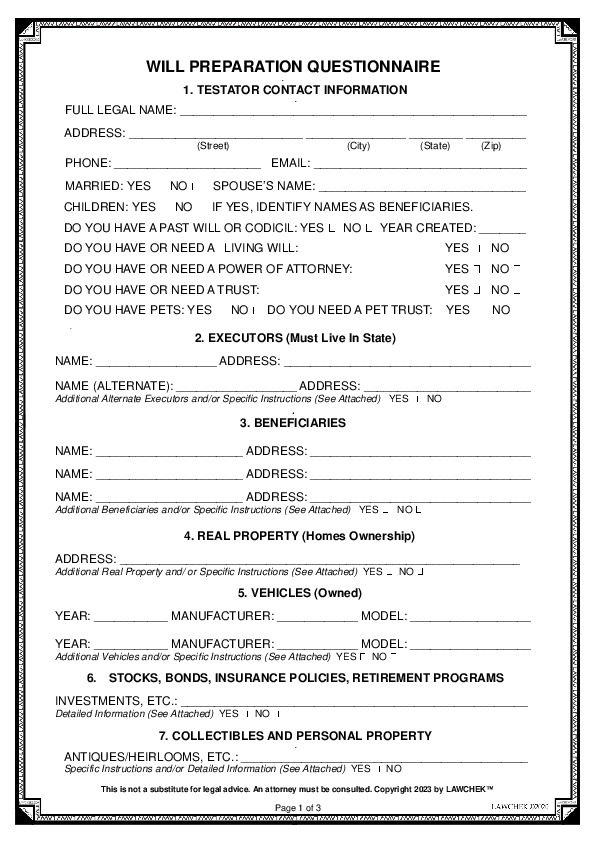 Check List for Will Check List for Will
If you are
asking the question, what information do I need to
plan for a Will, you are in the right place.
Preparing for the drafting of a Will can be
daunting, but we've made it relatively easy to
accomplish with the guidelines and basic Will
Preparation Questionnaire that can be downloaded to
use as you go through the steps provided below. When
you meet with an attorney, they have a longer, more
involved questionnaire that you fill out in greater
detail. This sample questionnaire gives you an idea
of the information an attorney needs so you can have
the basic aspects of your Will, such as who inherits
which assets, etc., decided and documented ahead of
time.
More Info
|
 Creating A
PET Trust Creating A
PET Trust
This
legal form book gives an overview and basic
understanding of Wills & Estates through a
question-and-answer format. It also furnishes some
basic Wills & Estates forms that most likely would
be used in a given state. This book should provide
the general types of Wills & Estates forms that an
attorney might employ in responding to client needs
and court requirements.
|
|
|
 Creating A Will Creating A Will
This
legal form book gives an overview and basic
understanding of Wills & Estates through a
question-and-answer format. It also furnishes some
basic Wills & Estates forms that most likely would
be used in a given state. This book should provide
the general types of Wills & Estates forms that an
attorney might employ in responding to client needs
and court requirements.
|
|
|
|
|
Family |
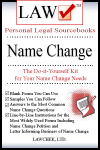 Name Change. Name Change.
This legal
form book gives an overview and basic understanding
of legal Name Change through a question-and-answer
format. It also furnishes some basic Name Change
forms that most likely would be used in a given
state. This book should provide the general types of
Name Change forms that an attorney might employ in
responding to client needs and court requirements.
More Info
|
|
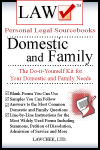 Domestic And Family . Domestic And Family .
This legal form book gives an overview and basic
understanding of Domestic & Family issues through a
question-and-answer format. It also furnishes some
basic Domestic & Family forms that most likely would
be used in a given state. This book should provide the
general types of Domestic & Family forms that an
attorney might employ in responding to client needs
and court requirements. Website
More Info
|
|
Home and Residentail |
 Don't Break the Bank: Tips for the Household Budget: Don't Break the Bank: Tips for the Household Budget:
Most of us always appreaciate new ways to be a bit
smarter with our money. If it wasn't your New Year's
resolution this year, you can always make a late
start and implement a few new approaches to making
your money last. Finishing taxes on one year and
looking at the lengthy year ahead, a little time
taken to reflect on spending habits can help lead to
better financial security during the slow economic
recovery. Although the majority of us do not have
direct influence on the big companies and banks, we
do control how we run our individual households, and
as the economy improves slowly, many of us will be
tightening our spending budgets and looking for ways
to save. Below we have provided some online
resources for everything from keeping a balanced
budget to finding ways to shop a bit smarter..
More Info
|
 Homeowners Insurance: What does your policy cover? Homeowners Insurance: What does your policy cover?
Many of us obtain our homeowners insurance when we
purchase our home. After this initial purchase, we
do not give this insurance another thought. It is
not until the roof is damaged during a violent
thunderstorm, a major appliance fails and floods our
basement, or the neighbor's kid slips and fractures
their wrist in our living room that we dust off the
policy and ask ourselves, "Am I covered for this?"
Don't wait until damage or an accident happens to
discover what your insurance policy includes.
Instead, you should have a good understanding of
your policy and every year you should assess if your
coverage should increase. The purpose of this
article is to point out some general characteristics
of homeowners insurance and help you determine if
you have the right coverage. Obviously this cannot
substitute for a consultation with your insurance
provider, but it will give you a better idea of what
questions to ask.
More Info
|
 Real Estate Real Estate
This legal form book gives an overview and basic
understanding of Real Estate through a
question-and-answer format. It also furnishes some
basic Real Estate forms that most likely would be
used in a given state. This book should provide the
general types of Real Estate forms that an attorney
might employ in preparing the necessary documents
for buying and selling Real Estate
More Info
|
|
|
Lien Waiver
This legal form book gives an overview and basic
understanding of Real Estate through a
question-and-answer format. It also furnishes some
basic Real Estate forms that most likely would be
used in a given state. This book should provide the
general types of Real Estate forms that an attorney
might employ in preparing the necessary documents
for buying and selling Real Estate
More Info |
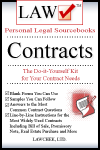 Contracts, Create a Contract. Contracts, Create a Contract.
This legal form book gives an overview and basic
understanding of Contracts through a
question-and-answer format. It also furnishes some
basic Contract forms that most likely would be used
in a given state. This book should provide the
general types of Contract forms that an attorney
might employ in preparing a Contract with an
individual or business
Website
|
|
| Insurance |
 Online Insurance: Is online insurance right for you? Online Insurance: Is online insurance right for you?
The Internet is a powerful tool for the savvy online
consumer. You can review products, compare prices,
research companies and purchase almost anything.
Following this trend is the increased availability
of insurance online. Insurance companies are
providing coverage information, quotes and even
contracts online. This includes automobile,
homeowners, life, medical and even pet insurance.
Insurance has traditionally been a high customer
service field with direct in-person contact with
your insurance agent. Because of the change in
customer contact, the migration towards providing
insurance online has not always been a smooth one.
Instead, companies are finding some tools work and
others only cause frustration or confusion. Indeed,
the availability of insurance online is still
fluctuating and developing. Below we have compiled a
few of the ways you can utilize online insurance
options and determine if it is the right tool for
you.
More Info
|
|
|
Natural Disaster |
 Flood Survival: How to prepare, respond, and recover from a flood Flood Survival: How to prepare, respond, and recover from a flood
Experience is sometimes an unforgiving instructor.
At Lawsonline™, we learned about devastation caused
by flood waters firsthand when Cedar Rapids, IA was
hit by a massive flood June 13, 2008. Lawsonline™ is
parented by enlighten technologies, inc.™, which
includes many other businesses such as LAWCHEK® and
LEGALCONFERENCE™. Our headquarters in downtown Cedar
Rapids was inundated with water after the Cedar
River crested at 31.1 feet (19.1 feet over flood
stage) to overtake 1,300 blocks of the city.* The
first floor was completely lost and when the water
reached 4 feet on the upper level, it was destroyed,
as well. After a slow road to recovery, and upon
reflection, we've written an article about what to
do if a flood hits your home or business. We hope
our readers never have to use the practical advice
in this article.
More Info
|
 Flood Survival Part II: Cleaning Up & Battling Mold Flood Survival Part II: Cleaning Up & Battling Mold
1. The Return: Again, do not enter until the
authorities have given the go-ahead. You may be
instantly charged if you do not comply with their
precautions. Remember, they are trying to help by
checking structures for integrity and other hazards
such as possible gas leaks. Also check to see how
the authorities want you to return to the site. They
may limit the number of people you take in, have
check in/out points, or other rules in place.
2. Tetanus: Make sure you have a current tetanus
vaccination. Although the CDC has stated on their
website that it is now not required to work in a
flood disaster area, they do mention that it is
beneficial in case an accident does occur. Tetanus
should be boosted every 10 years. You should have
a good idea if you have this beforehand. In Cedar
Rapids, tetanus vaccinations were offered to those
who had need. However, with the new information on
government websites like the CDC, these programs
may not happen at future floods. Therefore, know
if you have one so if you do get injured treatment
can be simplified.
More Info
|
|
|
Politics and
Government |
 2nd Amendment Interpreting the Second Amendment, An Introduction: 2nd Amendment Interpreting the Second Amendment, An Introduction:
The Second Amendment in the Bill of Rights was
melded together from several proposals and
simplified into twenty-seven words. This brevity is
often blamed for the enigmatic meaning that has
fueled the recent debate on guns, government, and
individual rights. Lawyers, judges, historians, and
political scientists delve repeatedly into the 18th
century world of the Framers in attempts to
ascertain the intended meaning of the Second
Amendment..
More Info
|
 2nd Amendment Judicial Interpretation of the Second Amendment: 2nd Amendment Judicial Interpretation of the Second Amendment:
Those who watch the headlines in the news today
cannot help but see an uncanny parallel between the
hypothetical scenario given by Justice Green and the
tragic mass shootings of the last few decades.
However, this opinion also highlights the perplexing
questions about the regulation of arms: What is the
line between legislation and a political right? Or
between law and a personal right? Is firearm
regulation appropriate? If so, how much? When is a
right infringed? How does society protect itself
from the few who would strike "terror to the
people"? When does "police power" become arbitrary?
Most discussions about gun rights and gun control in
the media and in public center around these
perplexing questions of how to make an imperfect
society safer .
More Info
|
 Citizen-Soldiers, Part I: Creating a well-regulated Militia Citizen-Soldiers, Part I: Creating a well-regulated Militia
In 1792, the first national legislation detailing
the organization of the state militias was enacted
after years of debate. Questions of local vs central
authority, local need vs uniformity, required
service vs substitution, and general militia vs
select militia were just a few of the recurring
issues that challenged the new country. Republican
ideals touted the idea of a citizen-militia who
protected liberty and would make the reliance on a
dangerous standing army obsolete. But efforts to use
the militia on the frontier and in wars as military
forces failed. These efforts removed the militia
from its traditional localized function and
inequalities of service, disorganization, and poor
preparation only proved the militia was useless on
the worst days or inconsistent on the best. So why
did the Founders cling to this ideal? A long
tradition of militias used effectively at the local
level and political thought that searched for a real
alternative to expensive and corruptible standing
armies encouraged the Founders to try militia reform
and revival. This Uniform Militia Act provided a
compromise of several conflicting ideas about how to
create the most efficient militia. However, in the
short history of the militia below, it becomes
evident that this Act did little more than
officially recognize preexisting local practices.
The lack of consequences for failing to comply with
the Uniform Militia Act ultimately left the militias
heavily localized, again relying on local initiative
for their success.
More Info
|
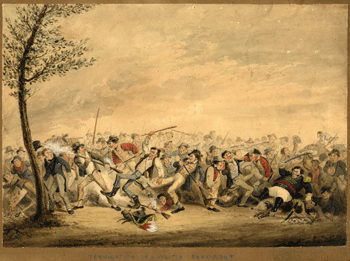 Citizen-Soldiers, Part II: Volunteer Militias and the National Guard: Citizen-Soldiers, Part II: Volunteer Militias and the National Guard:
The National Guard enlistment oath requires
enlistees to acknowledge their allegiance to both
federal and state authority. This select militia
developed from a foundational belief in the United
States that a militia, made up of citizen-soldiers,
should be central to local, state, and national
protection. Originally this militia was expected to
be a general militia that included all male citizens
eighteen to forty-five years old who would dutifully
abandon their civil life in times of need to become
the citizen-soldier. But the general militias met
obstacles from the very beginning that prevented
them from performing their idealized role and
meeting expectations. The militias were often
successful meeting local needs but proved
problematic when needed for an organized military
defense; they never materialized as a sustainable
replacement to a standing army. As the country grew
the general militias proved too unwieldy,
disorganized, and underprepared to provide even
local solutions and states increasingly favored
volunteer or select militias who advocated for
national support which would lead to the federal
organization of the National Guard. The focus on the
National Guard by state and federal governments
diminished and eliminated the viability of using the
general militia system. Ironically, several of the
country's Founders thought a federally run select
militia training system was unavoidable and
desirable but popular fears of centralizing too much
power in the national government prevented them from
creating a select militia
More Info
|
 How the Presidential Caucus Work for Iowa Participants How the Presidential Caucus Work for Iowa Participants
Every 4 years the race for the next president of the
united states starts in Iowa. They way Iowa votes is
unique because the state uses a caucus. Democrats
and Republicans will participate with their own
party members exclusively to decide their
presidential preferences for the 2012 election. It
should be noted that the Democratic party was the
first party in Iowa to initiate the Caucus
procedure. The Republican party followed with a
Straw Poll..
More Info
|
 Political Parties in the United States Political Parties in the United States
How will you vote? Democratic? Republican? Third
Party? Or will you vote as an Independent and choose
candidates based on their political platform,
regardless of party affiliation? When it comes time
to vote, most of us have chosen a candidate from one
of the two primary parties, Democratic or
Republican, and usually vote for the same party for
each office, even if we don't vote a straight ticket
ballot. But what about the lesser-known third
parties? It might surprise you to know that there
are nearly fifty recognized political parties
sponsoring candidates for various offices. Remember
- you don't have to vote for the same party for each
office. For instance, if you're a Republican and are
committed to voting for a Republican candidate for
the office of President in the 2012 Presidential
Election, that doesn't mean that in the next general
election you can't vote as an Independent and choose
a Third Party, such as the Green Party, for the
office of Governor in your state. Especially if the
Green Party candidate better represents your beliefs
and values on state issues. Or, if you want to see a
new direction in the Presidential office and have
decided to vote for a Republican candidate in the
2012 Presidential Election, you can still vote for
your current state Governor in the next general
election, even if their affiliation is Democratic.
It's all about voting for the candidate that best
reflects your views. Remember - no matter what way
others are voting, when you step into the voting
booth, it's completely confidential, and it's
entirely up to you!
More Info
|
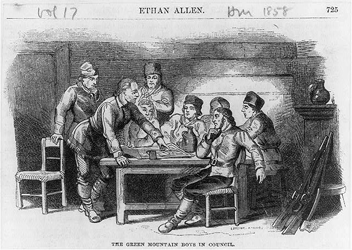 The Body of the People: Regulation The Body of the People: Regulation
Does the Second Amendment in the U.S. Bill of Rights
protect the right to bear arms in order to ensure
armed citizens can check government? Is there a
"right to revolution" inherently protected by the
Second Amendment? And, if so, does this idea include
a "right to insurrection" wherein armed protestors
or regulators can check administrative missteps
without dissolving the government outright?
More Info
|
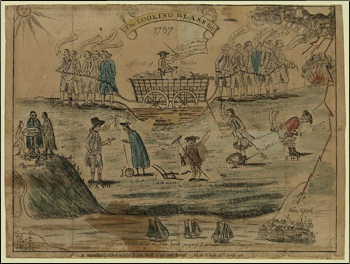 The Body of the People: Revolution The Body of the People: Revolution
How do you determine when a revolution is over? When
the fighting is done there are several, often
competing, points of view or goals that spurred the
revolutionaries to action. How do revolutionaries
begin to develop a constructive dialogue of
compromise? Who determines the majority and who
speaks for the "body of the people"? What happens
when the revolution has not achieved its goals for
everyone and how can those who disagree express this
dissent? This is precisely the challenge that
Americans faced after the Revolutionary War. This
struggle for defining and defending the various
goals of the revolution is illustrated in the
climatic events surrounding Shays’s Rebellion - a
rebellion sometimes called the last battle of the
American Revolution.
More Info
|
 The Body of the People: Rebellion: The Body of the People: Rebellion:
The ratification of the U.S. Constitution by all
states in 1790 came after the passionate debates
between Federalists and Antifederalists highlighted
the tensions between regional and national
interests. Can a representative government succeed
in balancing the local needs of communities against
the needs of the nation? James Madison argued in
Federalist #10 that a larger national government
would protect citizens from extreme shifts in policy
by factions and, as a result, protect minority
groups better than the smaller state governments.[1]
But this also required political minorities to
submit to the realities of a representative
government and respect the decisions of the
majority. Citizens had to accept that a balance
between benefits and disappointments was part of
establishing a peaceful government. In theory many
agreed this was a fair exchange but in practice
there were still lingering tensions. For many it was
difficult to suddenly accept that national interests
superseded their local needs. Conflicts could turn
violent when local political majorities found
themselves political minorities at the national
level. This struggle set off the Pennsylvania
Regulations of the 1790s, known more commonly as the
Whiskey Rebellion and Fries’s Rebellion..
More Info
|
|
|
Security and
Other Topics |
 Is videoconferencing your customer service solution?: Is videoconferencing your customer service solution?:
The evolution of the help desk for companies has
brought with it a variety of ways for clients to
correspond using the company website as a
communication platform. With e-mail already being a
standard replacement for printed memos and letters,
there is a growing demand for websites to offer even
faster communications with a personable presence,
and a direct convenience with instantaneous results.
The solution? Live Help (by enlighten technologies
incorporated™) - The Future of Customer Service for
Companies
More Info
|
 The Importance of Security for Video and Document Share: The Importance of Security for Video and Document Share:
Every manner of communication from the law office to
a client is expected and understood to be strictly
confidential. Naturally, a major goal of every
lawyer is to establish a lasting relationship with
the client through confidential and timely responses
to the client’s needs and requests. Therefore, an
“on-going” and “ever-ready” means of secure
communication serves to enhance the attorney-client
relationship. By the law office taking measures to
assure that all disclosures, documents, and
discussions are uncompromised and secure, the lawyer
conveys to the client the fact that the client’s
privacy is as important to the lawyer as it is to
the client.
More Info
|
|































